Climate AI Nordics Newsletter, September 2025
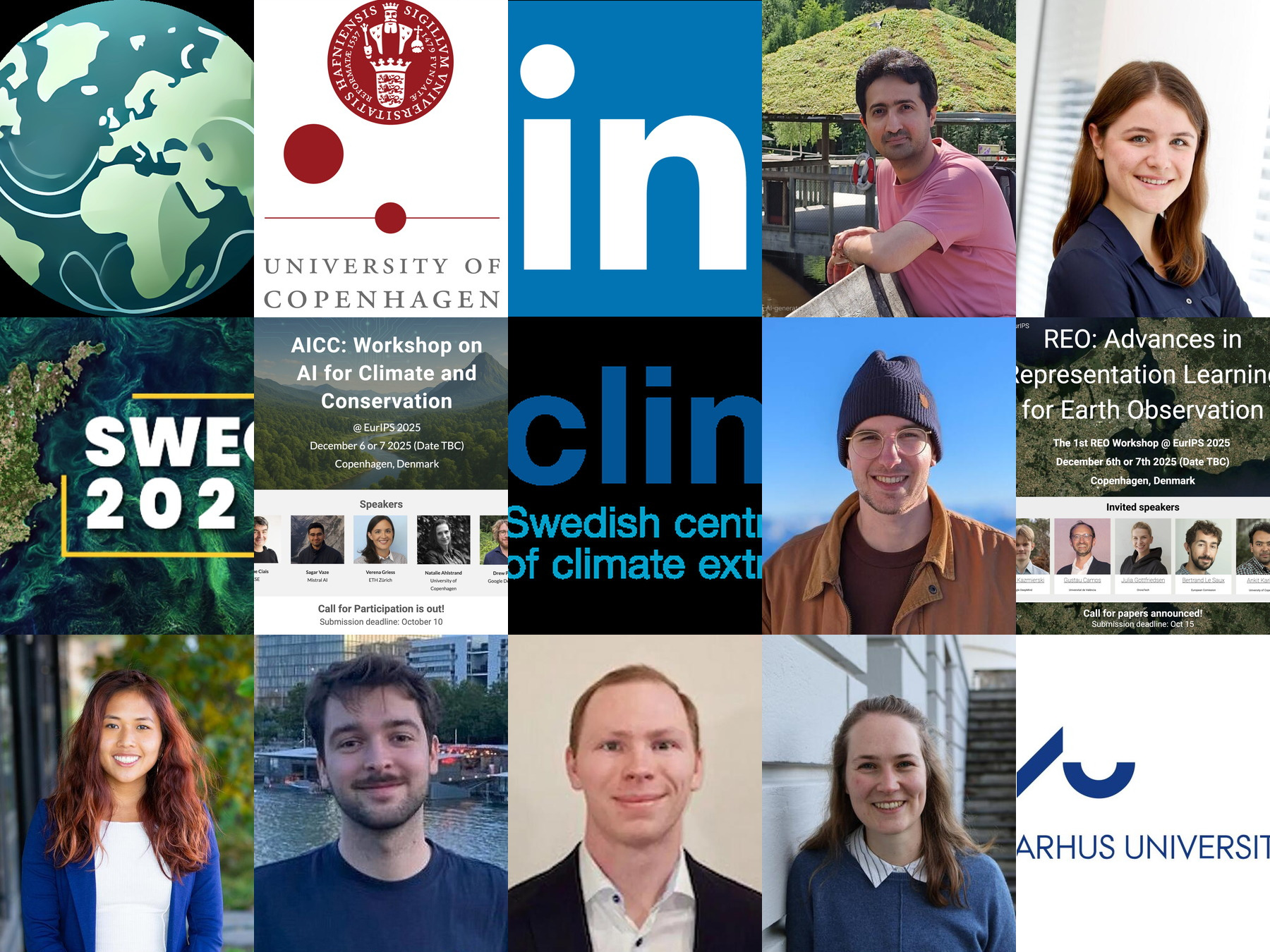
Welcome to the September edition of the Climate AI Nordics Newsletter!
Welcome to the September edition of the Climate AI Nordics Newsletter! This month’s issue highlights upcoming events on Earth observation, AI, and climate research, along with our featured member, Mohammad Kakooei, whose work advances scalable AI–Earth Observation for global sustainability. You’ll also find recent community highlights and new job opportunities across the Nordic region.
If you know colleagues in academia, public agencies, or industry who share these interests, invite them to join us at climateainordics.com/join.
This month’s issue features community updates, job opportunities, and our featured member.
News
Workshop on AI for Climate and Conservation (AICC) at EurIPS 2025
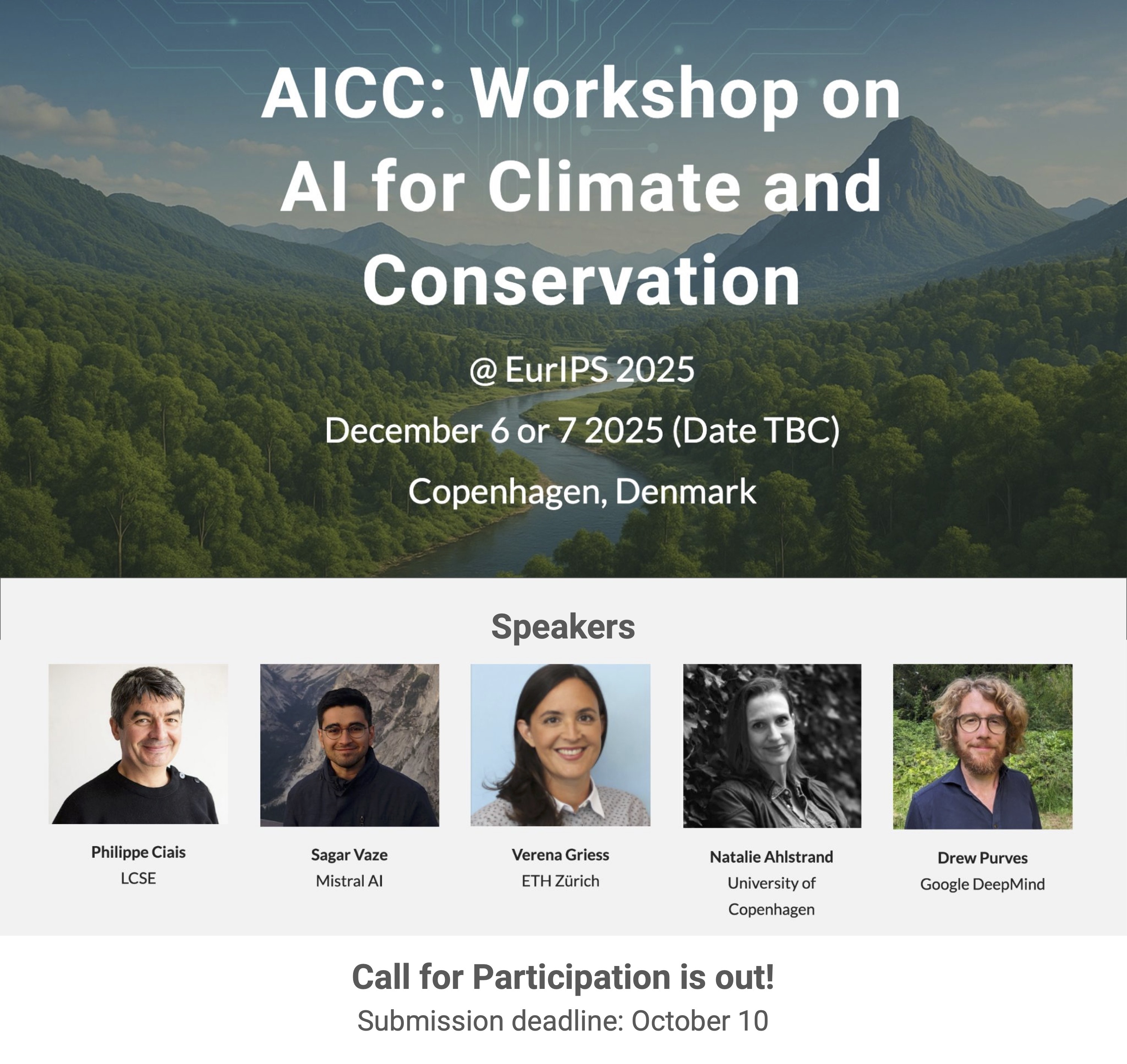
Event date: 2025-12-06 or 2025-12-07 (TBD).
Climate AI Nordics is excited to announce that the Workshop on AI for Climate and Conservation (AICC) has been accepted for EurIPS 2025! The AICC workshop will take place in Copenhagen, Denmark, Dec 6th or 7th (TBD; workshops are co-located with EurIPS)!
(Read more)
Climate AI Nordics now has 1000+ LinkedIn followers

2025-09-26 Climate AI Nordics keeps growing – over 1000 people are now following Climate AI Nordics on LinkedIn!
(Read more)
View our amazing recorded talks
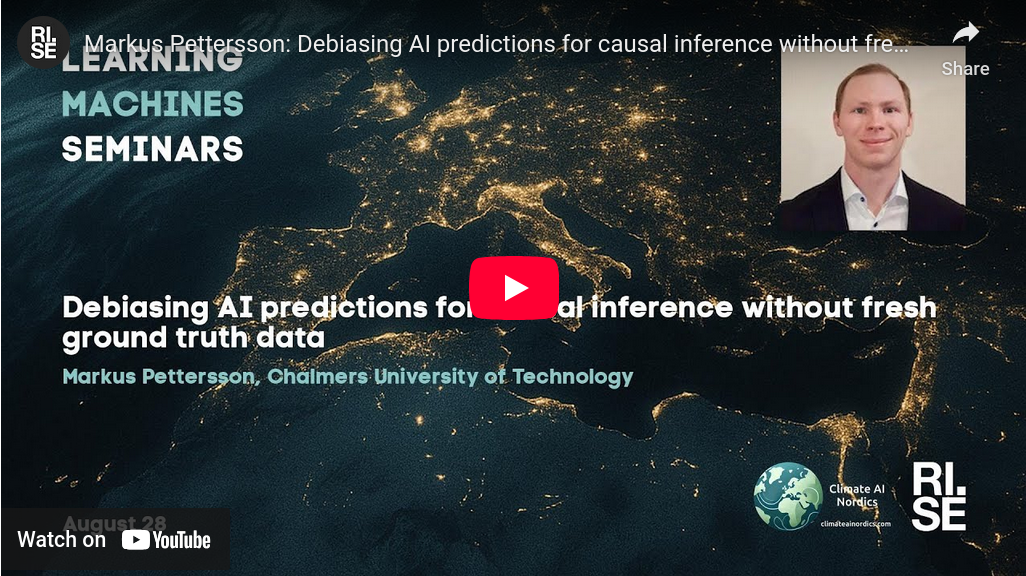
We have now added all recorded events to a news web page! Come back and view all amazing talks as many times as you like.
(Read more)
Featured member
Featured member, September 2025: Mohammad Kakooei
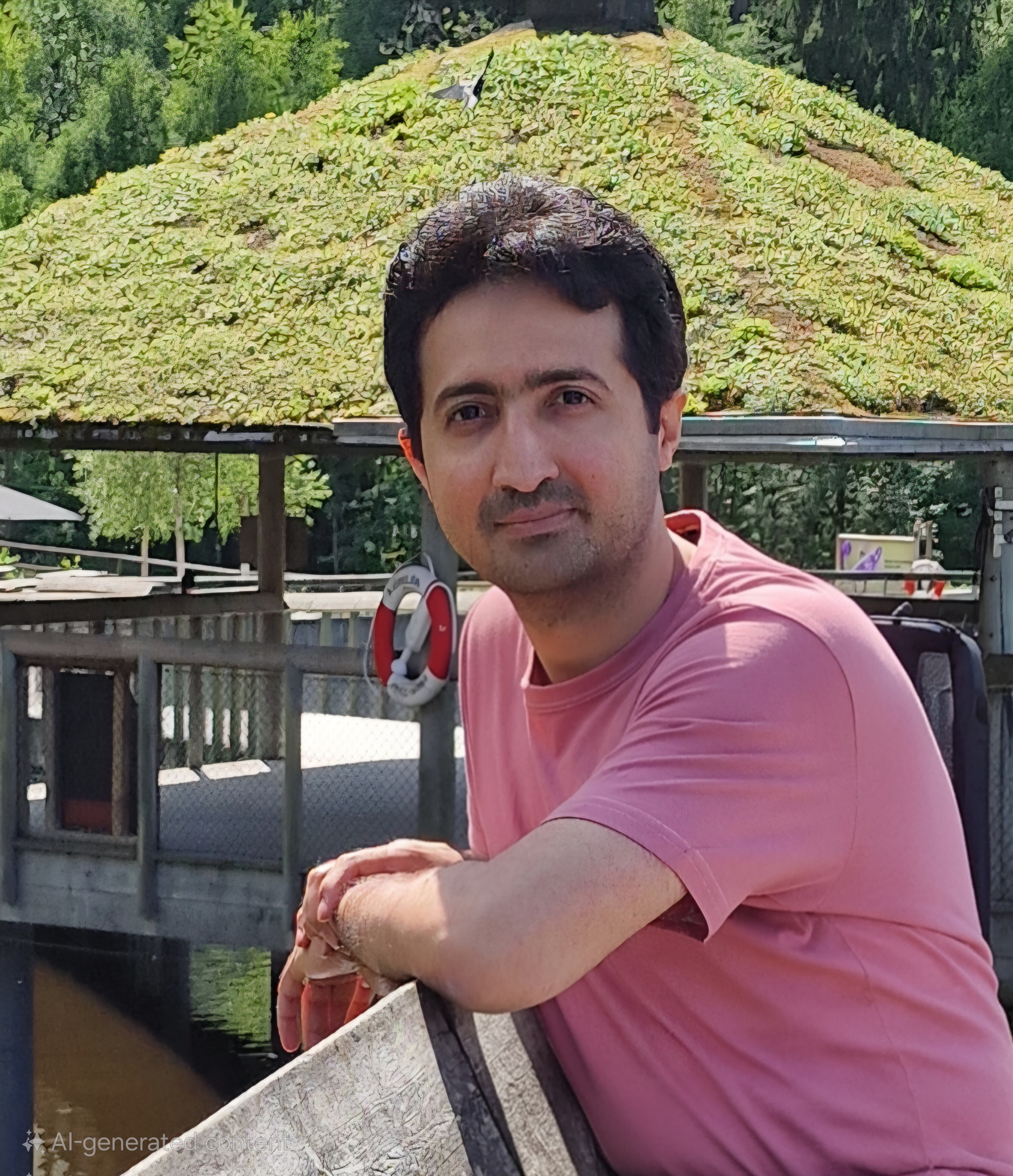
2025-09-26 Mohammad is a researcher at the AI and Global Development Lab, specializing in applying machine learning to Earth Observation (EO). His work focuses on scalable and trustworthy AI models that use satellite data to tackle societal and environmental challenges, including poverty estimation, disaster management, and climate change impacts. He has held positions at KTH Royal Institute of Technology and Chalmers University of Technology, and collaborated internationally with partners such as Harvard University. His long-term vision is to advance AI–EO research for sustainability and the UN Sustainable Development Goals.
(Read more)
Coming events
Earth observation and deep learning for urban applications

Event date: 2025-10-09.
Webinar with Sebastian Hafner, RISE. Urbanization is progressing at an unprecedented rate in many places around the world, making Earth observation (EO) a vital tool for monitoring its dynamics on a global scale. Modern satellite missions provide new opportunities for urban mapping and change detection (CD) through high-resolution imagery. At the same time, EO data analysis has advanced from traditional machine learning approaches to deep learning (DL), particularly Convolutional Neural Networks (ConvNets). Yet, current DL methods for urban mapping and CD face key challenges, including effectively integrating multi-modal EO data, reducing reliance on large labeled datasets, and improving transferability across geographic regions. This talk will present methods to address these challenges in urban mapping and CD, with applications such as multi-hazard building damage detection. It will also highlight the IDEAMAPS Data Ecosystem project, showing how its community-centric approach advances our understanding of urban deprivation and enables DL-based deprivation mapping.
(Read more)
Self-supervised pre-training for glacier calving front extraction from synthetic aperture radar imagery
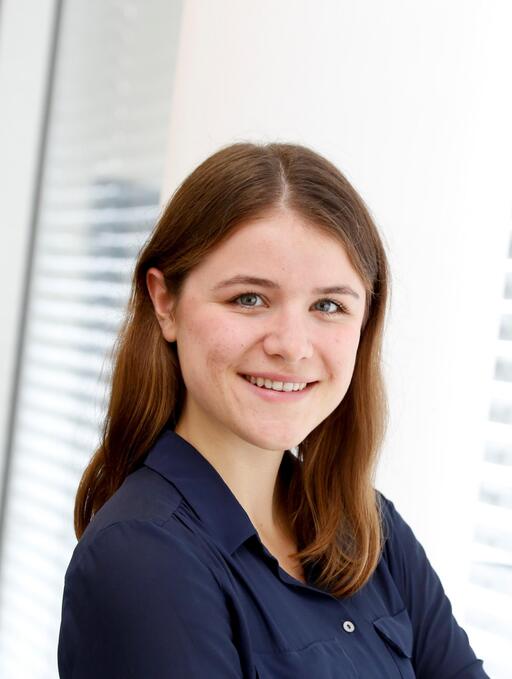
Event date: 2025-10-23.
Webinar with Nora Gourmelon, Friedrich-Alexander-Universität Erlangen-Nürnberg (FAU). The factors influencing melt at glacier fronts facing the ocean remain an active area of research. To better understand these factors, it is essential to monitor changes in glacier calving fronts. Due to the importance of weather-dependent and seasonal variations, Synthetic Aperture Radar (SAR) is the preferred imaging method for such monitoring. In recent years, deep learning models have been developed to automate the extraction of calving front positions, however, their performance on SAR data remains suboptimal. Limited labeled data and high variability in SAR images hinder traditional supervised learning. Foundation models pre-trained on large, diverse datasets could provide robust feature representations that require minimal labeled data for fine-tuning on specific SAR tasks. However, in preliminary experiments, we found that the domain gap is too large for the task of extracting calving fronts from SAR imagery, and foundation models fine-tuned on the "CAlving Fronts and where to Find thEm" (CaFFe) benchmark dataset performed subpar. Therefore, we compiled an unlabeled dataset of Sentinel-1 SAR image sequences of Arctic glaciers, each associated with a single Sentinel-2 optical reference image. Using this dataset, we developed a novel multi-modal self-supervised pre-training strategy and applied it to pre-train a hybrid CNN-transformer model. Fine-tuning on the CaFFe benchmark showed that the pre-trained model outperforms its non-pre-trained counterpart, enabling more robust calving front segmentation and demonstrating the potential of data-efficient learning for SAR imagery.
(Read more)
SWEO2025: Earth observation event in Stockholm
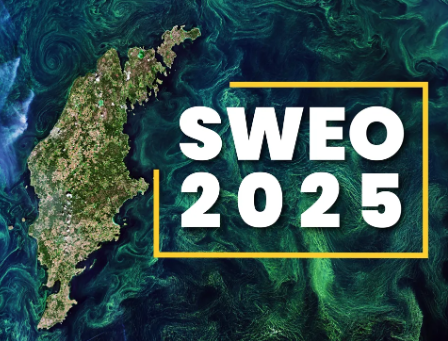
Event date: 2025-10-23 to 2025-10-24.
SWEO2025 is an event that revolves around the practical applications of Earth observation data, including within environmental monitoring and similar areas. The event takes place in Solna, Stockholm, between October 23rd and 24th. Click here for registration to the event.
(Read more)
International Conference: Climate Impacts in a Changing World 2026
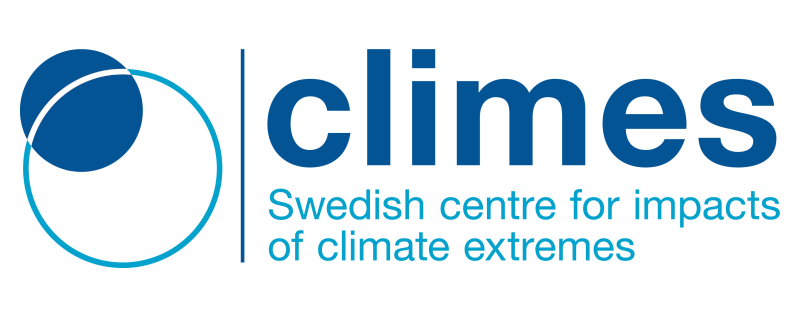
Event date: 2026-03-09 to 2026-03-11.
The Swedish Centre for Impacts of Climate Extremes (CLIMES) invites abstract submissions for the international conference Climate Impacts in a Changing World 2026, held in Uppsala on March 9–11, 2026. The event fosters interdisciplinary dialogue on the wide-ranging impacts of climate extremes on human and natural systems.
(Read more)
Workshop on Advances in Representation Learning for Earth Observation (REO) at EurIPS 2025
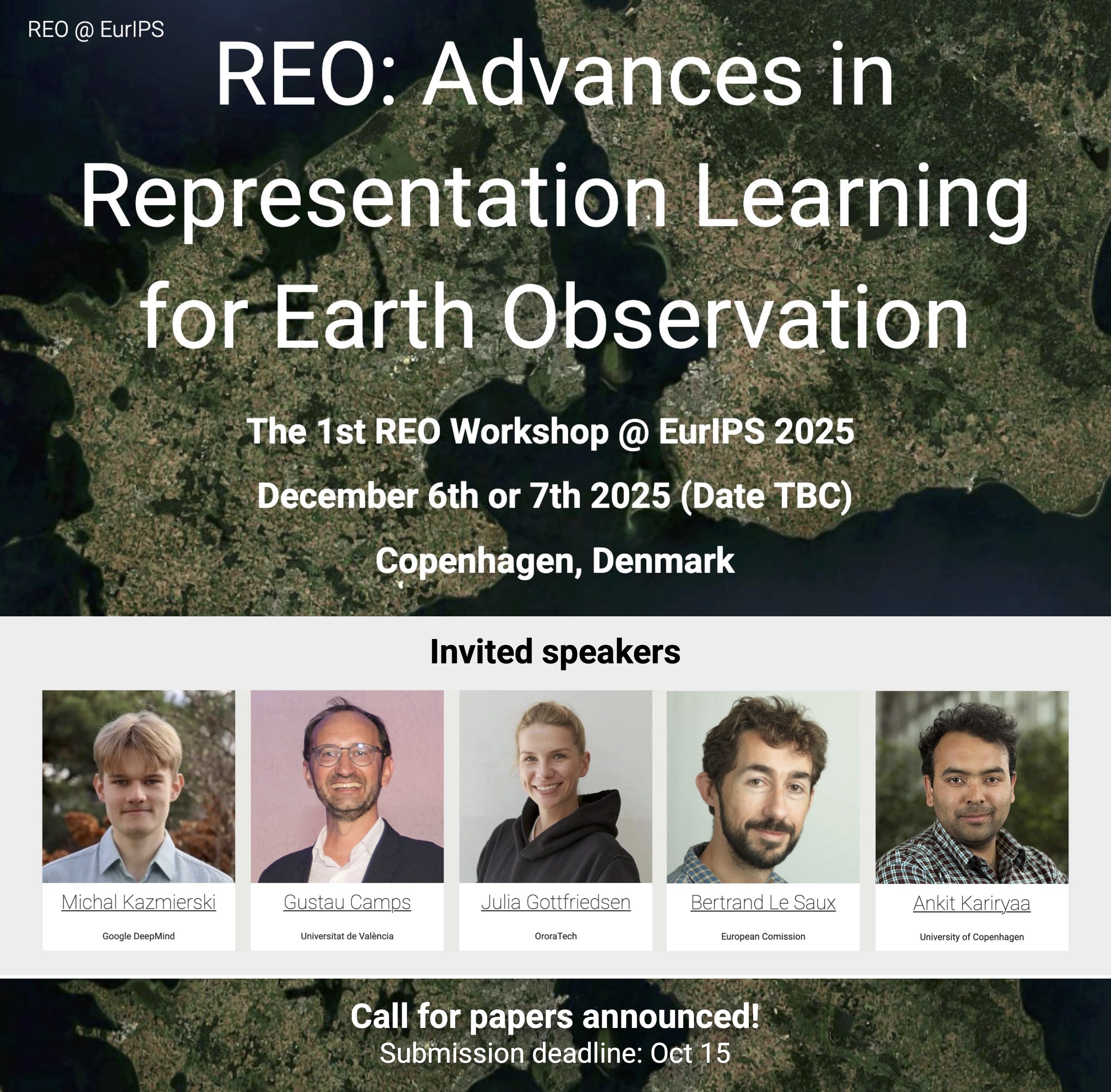
Event date: 2025-12-06 or 2025-12-07 (TBD).
The REO workshop will take place in Copenhagen, Denmark, Dec 6th or 7th (TBD; workshops are co-located with EurIPS)!
(Read more)
Recent events
High-stakes decisions from low-quality data: AI decision-making for conservation

This event took place 2025-06-19. Webinar with Lily Xu, Columbia University. Like many of society's grand challenges, biodiversity conservation requires effectively allocating and managing our limited resources in the face of imperfect information. My research develops data-driven AI decision-making methods to do so, overcoming the messy data ubiquitous in these settings. Here, I’ll present technical advances in machine learning, reinforcement learning, and causal inference, addressing research questions that emerged from on-the-ground challenges in wildlife conservation. I’ll also discuss bridging the gap from research and practice, with anti-poaching field tests in Cambodia, field visits in Belize and Uganda, and large-scale deployment with SMART conservation software.
(Read more)
Generative domain adaptation and foundation models for robust Earth observation

This event took place 2025-09-11. Webinar with Georges Le Bellier, CNAM. Deep learning for remote sensing plays a crucial role in turning satellite and aerial imagery into dependable, real-world insights. However, Earth observation models must handle diverse environments, sensors, and conditions—such as clouds, seasonal shifts, and geographic differences—while still producing accurate results. In this talk, we explore two paths that lead to more robust and adaptable algorithms: generative domain adaptation and geospatial foundation models. First, I will introduce FlowEO, a generative approach of Unsupervised Domain Adaptation (UDA) for Earth observation, and show its high performance in UDA scenarios for several downstream tasks, including dense prediction and classification. This flow-matching-based translation method improves pretrained predictive models' accuracies in challenging scenarios such as post-disaster response and high cloud coverage cases with SAR-to-optical translation. FlowEO’s generative domain adaptation method is independent of the downstream task and does not require retraining the predictive model. Then, I will present “PANGAEA: A Global and Inclusive Benchmark for Geospatial Foundation Models“, a standardized evaluation protocol that covers a diverse set of datasets, dense prediction tasks, resolutions, sensor modalities, and temporalities. This benchmark includes comparison between geospatial foundation models but also with supervised baselines, namely U-Net and ViT, and highlights the strengths and weaknesses of GFMs. In addition, PANGAEA evaluates models’ accuracy in cases where labels are limited and questions the impact of multi-temporal data for GFMs.
(Read more)
Debiasing AI predictions for causal inference without fresh ground truth data

This event took place 2025-08-28. Webinar with Markus Pettersson, Chalmers University of Technology. Machine learning models trained on Earth observation data, particularly satellite imagery, have recently shown impressive performance in predicting household-level wealth indices, potentially addressing chronic data scarcity in global development research. While these predictions exhibit strong predictive power, they inherently suffer from shrinkage toward the mean, resulting in attenuated estimates of causal treatment effects and thus limiting their utility in policy evaluations. Existing debiasing methods, such as Prediction-Powered Inference (PPI), require additional fresh ground-truth data at the downstream causal inference stage, severely restricting their applicability in data-poor environments. In this paper, we introduce and rigorously evaluate two novel correction methods—linear calibration correction and Tweedie's correction—that substantially reduce prediction bias without relying on newly collected labeled data. Our methods operate on out-of-sample predictions from pre-trained models, treating these models as black-box functions. Linear calibration corrects bias through a straightforward linear transformation derived from held-out calibration data, while Tweedie's correction leverages empirical Bayes principles to directly address shrinkage-induced biases by exploiting score functions derived from predicted outcomes. Through analytical exercises and experiments using Demographic and Health Survey (DHS) data, we demonstrate that both proposed methods outperform existing data-free approaches, can achieve significant reductions in attenuation bias and thus providing more accurate, actionable, and policy-relevant estimates. Our approach represents a generalizable, lightweight toolkit that enhances the reliability of causal inference when direct outcome measures are limited or unavailable.
(Read more)
Hyperparameter tuning, Bayesian optimisation and applications related to climate change
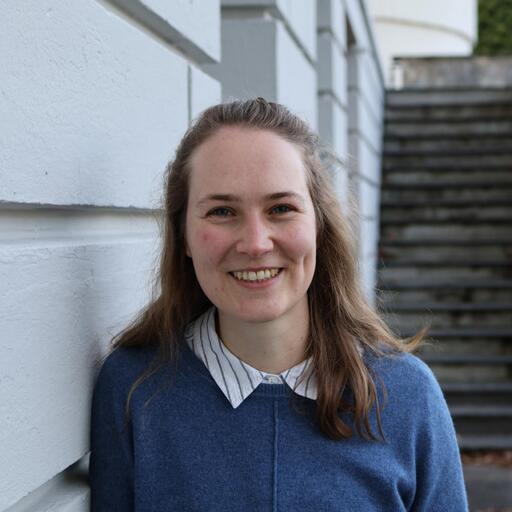
This event took place 2025-09-25. Webinar with Sigrid Passano Hellan, NORCE Norwegian Research Centre. If you don’t want to be setting and tuning machine learning model hyperparameters such as the learning rate yourself, then hyperparameter tuning is a good alternative. Also called hyperparameter optimisation, it has been developed to reduce the amount of machine learning experience required to set up a model by automatically finding the best hyperparameters. By reducing these hurdles to adoption, machine learning can be adopted for more climate applications. Bayesian optimisation is a popular method for hyperparameter optimisation, and consists of fitting a probabilistic model and using that to inform the optimisation process. Both hyperparameter optimisation and Bayesian optimisation can be greatly enhanced using transfer learning, where we learn from previous optimisation problems to speed up the current one. In this talk I will give an introduction to methods for hyperparameter tuning and Bayesian optimisation, and how transfer learning can be used. Then I will present how Bayesian optimisation has been applied to climate related research, as we discussed in a recent survey. We found the main application areas to be material discovery – finding better materials for solar panels; wind farm layouts – deciding where to place turbines; optimal control of renewables – e.g. adjusting wind turbine blade angles to current conditions; and environmental monitoring – e.g. finding pollution maxima.
(Read more)
Job openings
Postdoc in Climate Extremes & Population Health

Uppsala University’s CLIMES centre is hiring a postdoc to study the impacts of climate extremes (heatwaves, floods, droughts) on population health, with a focus on vulnerable groups.
(Read more)
Doctoral Position in Sociology – Sustainability and AI
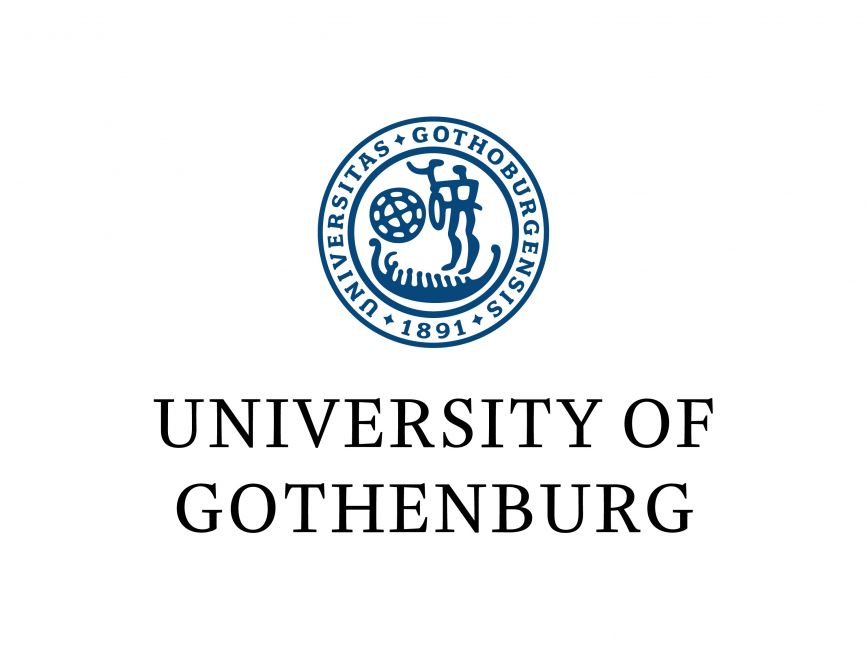
University of Gothenburg is hiring a doctoral student in sociology, with a focus on sustainability and AI, supervised within the Department of Sociology and Work Science.
(Read more)
PhD Fellowships in Machine Learning at University of Copenhagen (DIKU)

The University of Copenhagen is offering multiple PhD fellowships in machine learning, with a focus on climate and environment-related projects.
(Read more)
PhD in Remote Sensing of Vegetation Structure in Landscapes under Transformative Change
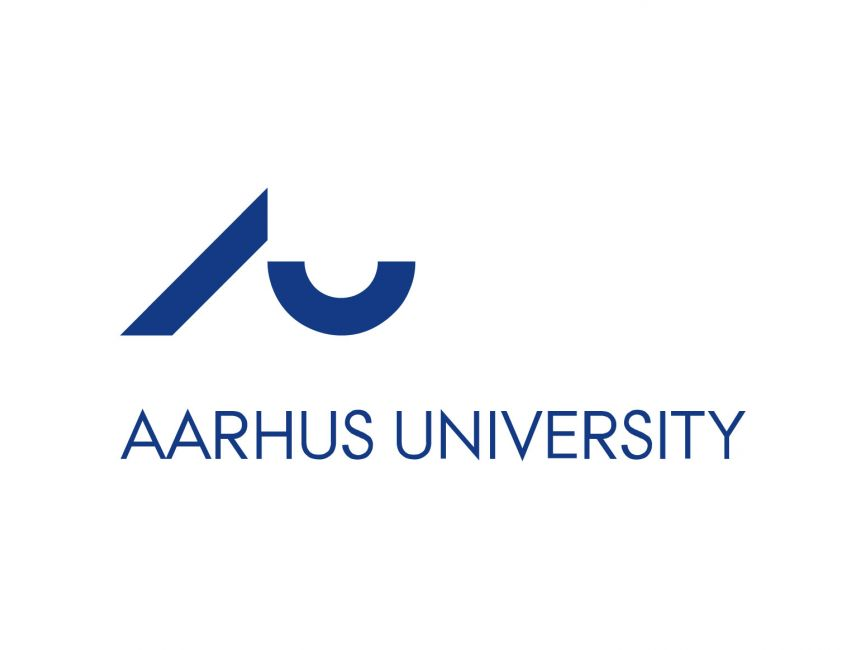
Aarhus University (Denmark) is hiring a PhD student in remote sensing of vegetation structure, focusing on monitoring biodiversity and sustainability in managed and natural landscapes under transformative change.
(Read more)
Climate AI Nordics – a community for collaboration and climate action
Since launching in October 2024, our community has grown to 181 members across the Nordic region and 66 international supporters. Together, we connect researchers and practitioners working at the intersection of artificial intelligence and climate action—spanning mitigation, adaptation, and environmental monitoring.
Make sure to share your work with us, by sending us an email ( contact@climateainordics.com), posting in our Slack or some other channel, and we’ll add it to the news feed! Take the chance of showcasing your work or your events to the community!
Also be sure to follow us on LinkedIn and BlueSky. Climate AI Nordics will have the most impact if you repost and like our stories!
Climate AI Nordics is a network of researchers working to harness AI in tackling the climate crisis through both mitigation and adaptation.
We promote the development of AI-based tools and optimization methods that support sustainable decision-making—helping reduce emissions, restore ecosystems, and build climate resilience.
